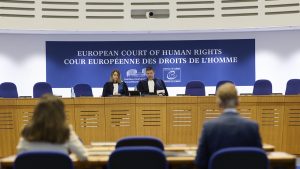By: Neha Chhablani
Impunity Watch News Staff Writer
STRASBOURG, France – On September 17, 2024, in the case of Pindo Mulla v. Spain, the European Court of Human Rights (ECHR) ruled that Spain had violated the right to privacy and religious freedom of Ms. Rosa Edelmira Pindo Mulla, a Jehovah’s witness, by administering blood transfusions against her will. The ruling marks another victory for individual autonomy and religious freedom in healthcare, reaffirming the ECHR’s commitment to self-determination.
 |
Ms. Rosa Edelmira Pindo Mulla, an Ecuadorian national living in Spain, firmly opposes blood transfusions due to her religious beliefs. Following a series of medical evaluations between May and July 2017, she was advised to undergo surgery to remove a myoma. In preparation for the procedure, she issued two legal documents—an advance directive and a lasting power of attorney—refusing blood transfusions under any circumstance.
On June 6, 2018, Ms. Pindo Mulla was admitted to the hospital due to severe internal bleeding. She reiterated her refusal of a blood transfusion and was transferred to a specialized hospital in Madrid that could provide alternative treatments. However, multiple miscommunications during this transfer—including incomplete sharing of her advance directive, unclear information about treatment preferences, and a failure to consult with her or her family—resulted in a duty judge authorizing blood transfusions without knowledge of her legal documents or religious beliefs. The doctors administered three life-saving blood transfusions while Ms. Pindo Mulla was unaware and unable to give informed consent.
Ms. Pindo Mulla pursued her case through each level of the Spanish judiciary before appealing to the ECHR. Both the local judge and the provincial court concluded that the absence of her advance directive and insufficient evidence of her refusal justified the transfusion. When the case reached Spain’s Constitutional Court, she argued that medical professionals violated her rights to legal protection, physical integrity, and freedom of religion, under Articles 24, 15, and 16 respectively of the Spanish Constitution. Ultimately, her appeal was deemed inadmissible as it did not meet the “special constitutional significance” threshold under Rule 54 § 3 of the Rules of Court.
On March 13, 2020, Ms. Pindo Mulla brought her case to the ECHR, claiming that Spain violated Article 8 (right to respect for private life) and 9 (freedom of thought, conscience, and religion) under the European Convention on Human Rights (ECHR). Spain relinquished jurisdiction to the ECHR on July 4, 2023, and the Grand Chamber hearing took place on January 10, 2024.
The court scrutinized the medical professionals’ decision-making process and evaluated whether they had shown sufficient respect for Ms. Pindo Mulla’s autonomy. Based on its investigation, the court determined that the doctors’ shortcomings in providing incomplete information and failing to confirm consent prevented her from exercising self-determination and autonomy. The court ruled that Spain had violated Article 8 in light of Article 9 and ordered the government to pay Ms. Pindo Mulla 12,000 Euros in non-pecuniary damage and 14,000 Euros for her legal costs and treatment expenses.
In this case, the ECHR had to carefully weigh the right to life under Article 2 of the ECHR and the right to religious freedom. While medical professionals justified their actions as necessary to preserve life, the court held that when a patient refuses treatment freely, autonomously, explicitly, and without ambiguity—as Ms. Pindo Mulla had done—the right to autonomy supersedes the right to life. By ruling in her favor, the ECHR reaffirmed the primacy of self-determination in healthcare and strengthened the legal protections of religious minorities in medical jurisprudence.
For further information, please see:
ECHR – Case of Pindo Mulla v. Spain – 17 Sept. 2024
ECHR – Grand Chamber Judgment Pindo Mulla v. Spain – 17 Sept. 2024
ECHR – European Convention on Human Rights – 29 Sept. 2024
Tribunal Constitucional de España – The Spanish Constitution – 29 Sept. 2024


